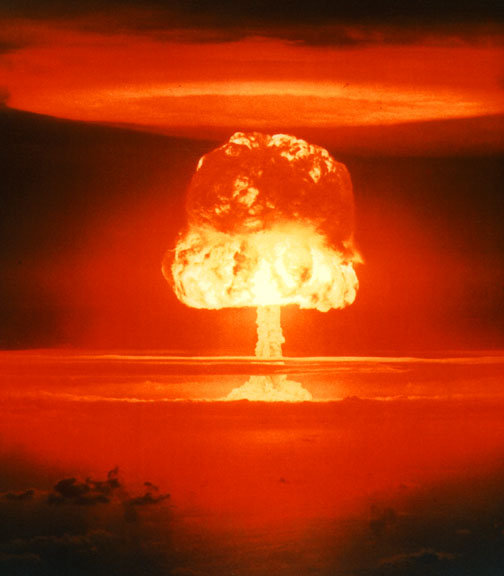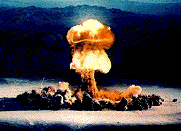 After the war in Europe was over, cities lay in ruins due to
the aerial bombing and battles that had caused widespread destruction. It was decided
at the Yalta Conference that parts of Germany would be given to Poland while the rest of it would be divided into
four parts. Berlin, the capital of Germany was also divided into four occupation zones. Berlin and Germany were to be occupied by the French, British, Americans and Russians in their respective occupation zones. East Germany, which was ruled by communist Russia, was separated by the Berlin
Wall from independent West Germany, thus giving a physical meaning to
Churchill's "iron curtain" that existed between the East and
West. After the war in Europe was over, cities lay in ruins due to
the aerial bombing and battles that had caused widespread destruction. It was decided
at the Yalta Conference that parts of Germany would be given to Poland while the rest of it would be divided into
four parts. Berlin, the capital of Germany was also divided into four occupation zones. Berlin and Germany were to be occupied by the French, British, Americans and Russians in their respective occupation zones. East Germany, which was ruled by communist Russia, was separated by the Berlin
Wall from independent West Germany, thus giving a physical meaning to
Churchill's "iron curtain" that existed between the East and
West.
|
 The war
in the Pacific ended
when Japan surrendered
following the atomic bombing of Hiroshima and Nagasaki.
Truman's rationale for using these catastrophic devices was to prevent the
greater number of deaths that would occur if the US were to invade the Japanese mainland.
Fortunately,
his decision did bring about the end of the war. Unfortunately, this also opened up
a more dangerous can of worms: the nuclear arms race. The war
in the Pacific ended
when Japan surrendered
following the atomic bombing of Hiroshima and Nagasaki.
Truman's rationale for using these catastrophic devices was to prevent the
greater number of deaths that would occur if the US were to invade the Japanese mainland.
Fortunately,
his decision did bring about the end of the war. Unfortunately, this also opened up
a more dangerous can of worms: the nuclear arms race.
While the US and Soviet Union emerged as the two most powerful
nations on earth, opposing national interests would usher in the Cold War era that would last until the late 1980's.
By the time of the signing of the Axis satellite treaties early in 1947, the two countries were drawing apart.
Before long, the Soviets had built and tested their own nuclear devices,
which served to increase tensions between the two nations,
drawing them even further apart.
Fearing the spread of communism, the US committed troops
to suppress communist governments in various hotspots worldwide.
This "policy of containment" soon dominated the United States'
attitude towards foreign affairs, even if it led to corrupt dictators
gaining power or supporting weak, non-communist governments.
Meanwhile, those back in the US weren't immune from this policy either, as
fear of communist infiltration (or the "red
scare") swept the nation. Later, civil unrest would erupt
once again in protest of the Vietnam War and life back in the
states.
Meanwhile, the cold war pushed on.
|
|
 Hoping
to gain the upper hand in defending their home soil, both the US and the Soviets
aimed
nuclear-warhead-tipped ICBM's at the other's major cities and industrial
areas. These missiles could be launched at a moments notice, meaning
immediate retaliation for any warranted or unwarranted aggression. Worse
yet, these missiles could not be retrieved once fired, meaning that a simple
mistake could lead to nuclear war. Hoping
to gain the upper hand in defending their home soil, both the US and the Soviets
aimed
nuclear-warhead-tipped ICBM's at the other's major cities and industrial
areas. These missiles could be launched at a moments notice, meaning
immediate retaliation for any warranted or unwarranted aggression. Worse
yet, these missiles could not be retrieved once fired, meaning that a simple
mistake could lead to nuclear war.
Only this fear of imminent retaliation and total annihilation would keep these two
superpowers from using their nuclear arsenals on one another.
But in the meantime, no place on earth would be safe.
|
|
Luckily, we
now know that the world would survive, but needless to say, it was a
powerful threat and worrisome burden on those who had to live during this
fragile time period. In fact, the entire world
depended on it!

|
Copyright © 2000 [Matt Wilhelm]. All rights reserved.
This page was last updated on 07/25/00.
|